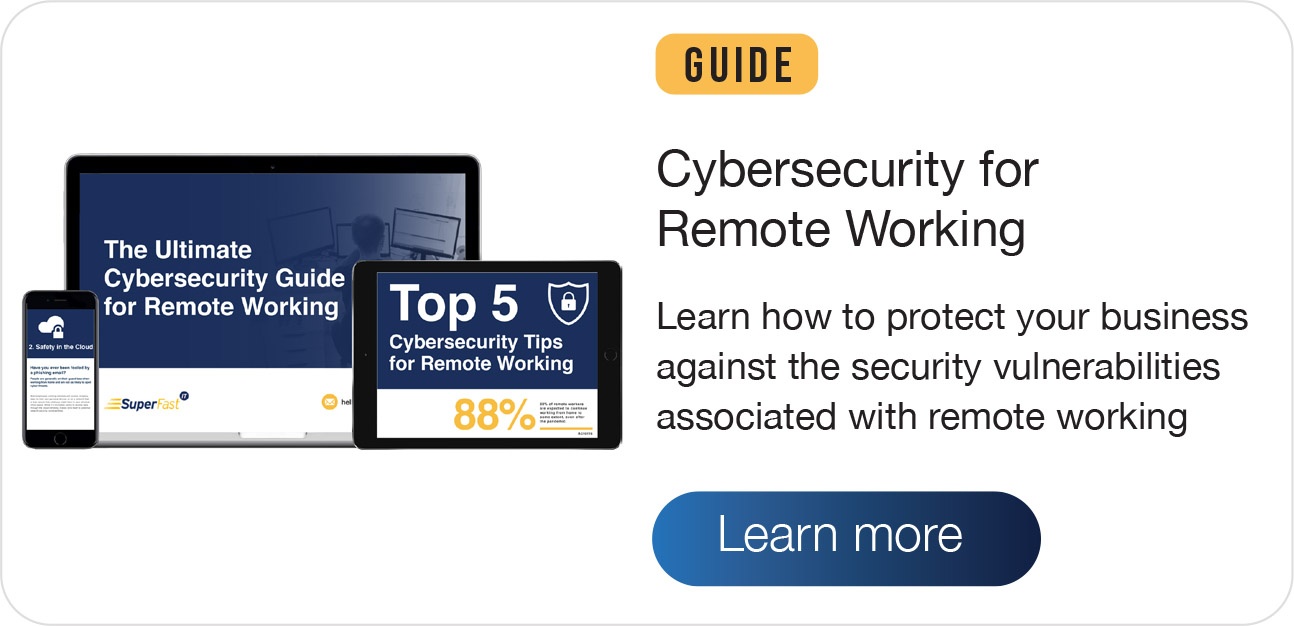Remote working: Managing cybersecurity risks in 9 steps
Photo credit: Writix During the first lockdown, our priority was to quickly facilitate working from home and keep business moving. We did this...

Remote working is a standard practice amongst businesses today. The accelerated transition to hybrid working during the pandemic has led to a greater reliance on digital services. However, it has also incentivised organised crime groups towards cyber crimes.
The latest crime survey estimating that cyber crimes have increased significantly between 2019 and 2021 during COVID because of remote working.
Now is a good time to check that your long-term cyber security arrangements are up to scratch for remote working. This means:
Employees working from home should understand the steps they should take to keep their business' data secure (processes).
Business owners should have certain measures in place to keep their business systems secure (controls).
Download our ultimate cyber security remote working guide to understand if your cyber security is fit for purpose.
If you are unsure what remote working cyber security controls look like or you have had to relax your security to ensure employees can work remotely, then our downloadable guide can help:




The guide explores five areas of cyber security for remote working:
Security awareness access, report and repeat
Security awareness training
Safety in the cloud
Real dark web threats
Access management & two-factor authentication
I would recommend reevaluating what you currently do against best practice. Take a look at our 9 point guide to managing remote working risks.
Twelve months ago, businesses excelled in rapidly setting up remote working arrangements. However, long-term cyber security considerations weren't necessarily made while ramping up remote working. Now is the perfect time to re-evaluate your cyber security policy and controls.
Many of these considerations do not need huge amounts of investment, it's just as much about instilling a good cyber security culture into your business.
Here are seven considerations when evaluating your security policies and technology solutions:
Do you provide employees with equipment or do they use their own? Ideally employers should provide dedicated work devices – this enables you to take control of the device; what is installed and how it is set up. It can then allow you to remove access to your IT infrastructure if it is stolen or the employee hands in their notice. Employees using their own devices for work has its own set of security guidelines.
Do your employees use passwords more than once? Do you use two-factor authentication as an extra barrier?
Do your employees allow family members to use work devices? They shouldn’t! You may need to update your security policy or provide your staff with training on remote working cyber security and best practise.
Do you activate passwords when arranging and holding meetings?
Are your employees using a VPN while remote working? Have you checked?
Imagine an email posing to be from your business’ HR asking to confirm sensitive data. Would your team respond or click on a spam link? You may have to wait 200+ days to find out that your IT infrastructure has been compromised – the average time it takes to spot a cyber-attack. Your team may need training to approach all emails and invites with precaution.
Have you found safe cloud computing solutions for a long-term and secure solution? Cloud servers, cloud telephone systems and monthly SaaS subscriptions - there are many technology solutions available that enable collaborative and secure working.
Employers and employees are seeking a long-term flexible home-office arrangement. Both employees and employers have found benefits from working from home, namely:
Many report to be more focussed and less distracted at home.
Also, consider an offsite meeting. Time is saved in the journey to and from. The meeting itself online tends to be more focussed and productive.
Less travel inevitably means less fossil fuels being burned.
If you can reduce your office space with more people home working, you can reduce expenditure and associated rates that come along with it.
With the majority of workforces not having to commute, it means that time can be spent with children and family instead. It's difficult to get the right balance
With remote working here to stay, make sure you have the right long-term cyber security in place. Download our guide for an easy five step approach to remote working cyber security.

Photo credit: Writix During the first lockdown, our priority was to quickly facilitate working from home and keep business moving. We did this...

Email filtering helps to stop spam and junk mail from entering your inbox. But there will be instances where email filtering systems need your help...

Maintaining network security while employees work from home is a challenge. Work-from-anywhere is the new norm. COVID19 has drove us to embrace...